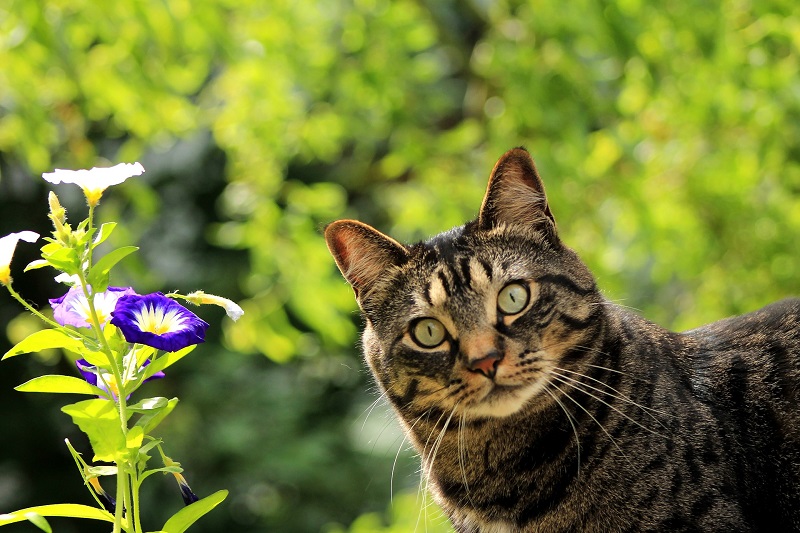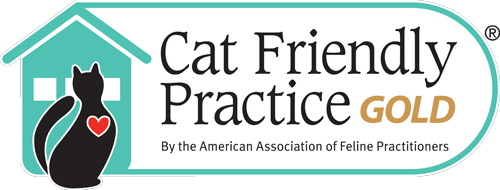Springtime Cat Care: Tips for Tucson Felines
Ah, springtime in Tucson! The sun shines brighter, the desert blooms, and our feline friends start to perk up with the warmer weather. While spring is a lovely season, it also brings some unique considerations for cat owners. Here’s your guide to ensuring your cat enjoys a safe, healthy, and happy Tucson spring.
- The Great Outdoors: To Roam or Not to Roam?
As temperatures rise, your cat may be eyeing the door, thinking about an outdoor adventure. The decision of whether to let your cat outside is yours to make, but here are some factors to consider:
- Safety: Tucson has traffic, predators like coyotes and owls, and other potential dangers. Injuries are commonplace with outdoor cats including being hit by cars. An enclosed catio or supervised walks on a harness offer safer ways to enjoy the outdoors.
- Health: Outdoor cats are at higher risk for intestinal parasites, ear mites, heartworm disease, feline leukemia (FeLV) and feline immunodeficiency virus (neither of which have a cure). Ensure your cat is fully vaccinated (including FeLV) and on preventative medications.
- Environmental Impact: Cats are natural hunters. If your cat roams, consider providing a bell on their collar to help protect birds and other wildlife.
- Beware of Springtime Hazards
- Toxic Plants: As flowers bloom, be mindful of lilies. All parts of lilies are extremely toxic to cats and can cause kidney failure. There is actually quite an extensive list of plants that are found in Arizona that are toxic to pets. Here is a not so short list we’ve compiled so far:
- Arum Lily
- Autumn Crocus
- Australian Flame Tree
- Avocado
- Azalea Baneberry
- Bird Of Paradise
- Bishop’s Weed
- Black Laurel
- Black Locust
- Bleeding Heart
- Bloodroot
- Bluebonnet
- Blue-Green Algae
- Boxwood
- Bracken Fern
- Buckthorn
- Bulb Flowers
- Burdock
- Cacao
- Camel Bush
- Caladium
- Calla Lily
- Cardinal Flower
- Chalice
- Cherry Tree
- Chinaberry Tree
- Clematis
- Cocklebur
- Coffee
- Coral Plant
- Coriander
- Dieffenbachia
- Elderberry
- Elephant Ear (Taro)
- Eucalyptus
- Euonymus
- False Hellebore
- Flame Tree
- Felt Plant
- Firethorn
- Four O’Clock
- Foxglove
- Glottidium
- Golden Chain
- Ground Cherry
- Heaths
- Heliotrope
- Hemlock
- Henbane
- Holly
- Honeysuckle
- Horse Chestnut
- Horsetail
- Hydrangea
- English Ivy
- Jasmine
- Jimsonweed
- Lantana
- Larkspur
- Lily Of The Valley
- Easter Lily
- Lupine
- Marijuana
- Mandrake
- Mexican Poppy
- Milkweed
- Vetch
- Yellow Jasmine
- Mistletoe
- Mock Orange
- Monkshood
- Moonseed
- Morning Glory
- Mountain Laurel
- Mushrooms
- Nightshades
- Oak
- Oleander
- Periwinkle
- Philodendron
- Pigweed
- Poinciana
- Poinsettia
- Poison Ivy
- Poison Oak
- Pokeweed
- Potato Shoots
- Privet
- Pyricantha
- Rain Tree
- Ranunculus (Buttercup)
- Rape
- Red Maple
- Snowdrop
- Spurges
- Sweet Pea
- Tansy
- Tobacco
- Wisteria
- Yews
- Poisons & Pesticides: Spring cleaning and gardening often involve chemicals. Store these securely, always follow product instructions, and keep cats away from treated areas.
- Open Windows: Secure screens to prevent falls or escapes. Cats are agile but even they can have mishaps!
- Spring Allergies: Humans Aren’t the Only Ones
Yes, cats can suffer from springtime allergies too! Signs to watch for include:
- Itchy Skin: Excessive scratching, licking, or overgrooming.
- Sneezing and Coughing: Respiratory symptoms similar to our own.
- Eye & Nose Discharge: Watery eyes or a runny nose.
If you suspect allergies, consult our cat experts at the Cat Hospital of Tucson. We can recommend diagnostics and treatment options.
- Shedding Season: Say Goodbye to Winter Fur
Get ready for more fur! Cats shed their thick winter coats during spring. Help your cat (and your furniture) by:
- Regular Brushing: Increase brushing frequency to remove loose fur. Choose tools designed for your cat’s coat type.
- Bathing (If Tolerated): A warm bath can help loosen dead hair. This isn’t for every cat, so proceed with caution!
- Diet: High-quality food supports healthy skin and coat, potentially reducing shedding.
- Pests and Parasites: Prevention is Key
Warmer weather means an increase in fleas, ticks, and other pests. Yes we have fleas and ticks in Tucson! Don’t wait for an infestation!
- Year-round Protection: Consult the Cat Hospital of Tucson for the best flea and tick prevention for your cat. We know the specific risks in our area and can set-up recurring appointments to be sure your cat is as healthy as possible.
- Heartworm Preventative: Mosquitoes transmit heartworm. Although not as common in Arizona, we are seeing the numbers of heartworm infections in cats increase. There is no cure for cats who get heartworm disease. Make sure your cat is protected.
- Enjoying the Spring Sunshine
Cats love basking in the sun! Of course, we want to provide them with that luxury. Here’s how to make it a safe and enjoyable experience:
- Supervised Sunbathing: Provide a comfy spot by a sunny window with a secure screen, or on an enclosed porch.
- Water Access: Ensure fresh water is always available, especially during warmer weather.
- Shade Options: Offer a way for your cat to get out of the direct sun if they get too warm.
Bonus Tip: Spring Cleaning Cat-Style
While you’re spring cleaning your house, consider refreshing your cat’s essentials too:
- Clean the Beds: Give their favorite beds and blankets a good wash.
- Toys Audit: Toss any broken toys and introduce some new ones for springtime fun.
- Litter Box Upgrade: If it’s been a while, consider replacing the litter box itself.
The Cat Hospital of Tucson: Your Springtime Partner
Need advice on heartworm, flea and tick prevention? Concerned about allergies? Want a checkup to ensure your cat is in peak condition for spring? We’re here to help! Contact the Cat Hospital of Tucson for all your feline health and wellness needs.











